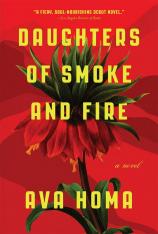Excerpt
Excerpt
Daughters of Smoke and Fire

CHAPTER FIVE
When the first rays of light slanted through my slatted blinds the next morning, my head no longer pounded, but my limbs protested when I tried to move. Snarling and groaning did not make me feel better. All night I’d dreamed that a man in a black suit was trailing me wherever I went. Mr. Bad Luck, my family’s legacy, scoffed at my failed attempts to outpace him.
The house was eerily quiet, which meant my parents were either still asleep or had already left. I went downstairs to the basement studio, now converted into Chia’s bedroom, which was bright with curtainless windows. He’d papered his walls with posters of Che Guevara, Gandhi, and Nelson Mandela. No thinker would rebuke Chia for his greasy hair. He was yawning, scratching at his faint shadows of facial hair, and solving physics equations from the open textbook on his desk.
Needing a distraction, I ironed his khaki shirt and pants that I had laundered the night before, as I had done religiously since he was nine. With each year that passed, Chia was praised at home and school for his intelligence, and I was blamed for not being as clever and as neat as he was. I was good at erecting my gallows.
“Don’t you want to read some Tolstoy, Leila? Leave that iron. The pants are going to get wrinkled again soon enough,” Chia said, head resting on his palm. He was always dismissing chores as a waste of time, convinced that he had so much else to do for this world. Yesterday he’d said, “Why should I make my bed when I have to sleep in it again tonight? I could spend that time each morning reading about the rise of fascism and World War II. So ridiculous that the battles fought by wealthy countries are called ‘World War’ and poor countries’ fights are ‘tribal war!’”
I made creases with the iron. I had been trying to serve my family, eradicate filth from our home, but nothing I did was ever enough. Nothing I did could make my parents praise me, make my brother notice my sacrifices, or even make God save me from “sorrow and fear,” as advertised in the holy book.
The siren of an ambulance broke my train of thought. Light shone through the mullioned window onto Chia’s gray bedding. A copy of War and Peace was lying on his unmade bed. “Did you really read all twelve hundred pages?”
“It was a great read.” Chia chewed his pen cap. “Did you read the copy of Nineteen Eighty-Four I gave you?”
Steam rose from the iron. I did not look at him, but I could picture him pointing a finger at me as he spoke, his usual gesture. I had tried reading it, but Orwell’s dystopia was my—our—reality. I needed books that offered escape, not ones that held up a mirror to our suffering.
“I slept in this room on that bed with Shiler and Joanna the night you were born.”
“What’s eating you, Leila?”
I made myself busy folding his pants. “I miss Shiler. I hardly see her these days.”
“What is it really?”
“Your window is filthy,” I announced. “There’s a pile of clothes I need to iron for you.”
I expected Chia to roll his eyes. Instead he got up from his desk and stood before my ironing board. “That’s not all, is it?”
With that question, my teenage brother smoothly removed my mask. I broke down. “I didn’t make the list. I’m never going to get into a university I can afford, and if I do, it’ll be of no use. I’ll end up like our father. Or worse, our mother.”
“Oh, come on. So what if you didn’t get in this year? You don’t have to do military. You can study for next year.”
“All I want from life,” I sniveled, “is to have a college education so I can have a decent job. Make films, tell our stories.”
“Stop it with the self-pity already. I’m sure you’ll get in next year. You have a year to prepare. Start tomorrow.”
I searched his eyes. He believed what he was saying. I put the tips of my fingers into a bowl of water, splashed drops on his shirt, and resumed ironing. I pressed down hard on Chia’s shirt, close to scorching it. For a moment I considered holding the hot iron against my face until it melted through my skull and burned away my disillusionment.
“Do you ever think you and I ruined Baba’s life?” Chia asked when I’d finished.
“Why?” I unplugged the iron.
“I don’t mean deliberately. But look, I was born the day his town was gassed.” He scratched his neck.
“Well, I wasn’t.”
“You know how he wanted to name you Nishtman, but the government banned it?”
“Of course.”
“Nishtman was the girl he loved in high school and wanted to marry.”
I wondered about this girl who had been called Nishtman, homeland, named after an unrecognized, unofficial, yet beautiful country. I imagined her with inspiring hazel eyes, full of hope, full of courage. “Was it my fault it didn’t happen?”
“No, no. She decided to join the Peshmerga fighters, and Baba was accepted into Tehran University, so he decided not to follow her. A decision he must have regretted a thousand times, I suppose.”
Peshmerga: those who face death. What a brave girl. An educated dreamer at a time when women weren’t supposed to be either. I imagined her holding her head high and walking with a grace that lent her incredible charisma. But Nishtman the girl, just like nishtman the Kurdish homeland, was unattainable. “So she chose the weapon and he picked the pen. And both failed.” I sighed. “Mama said she died.”
Chia shrugged. “Technically she ‘disappeared.’ It looks like the powerless in this world are doomed to defeat regardless of what means they pick to fight. And yet resisting and losing is better than dying silently, no?”
“What does that have to do with us ruining his life, anyway? If he wanted to name me after her, he must have loved me or had hopes for me.” In Baba’s room in the attic was a poster of a man in Kurdish clothing, holding up a picture of a young girl killed in the genocide, showing all that remained of her to the photographer. “I suppose he hoped I’d do something for our people, and I want to—you know how much I want to make films to share our stories—but so far I’ve amounted to nothing.”
“Baba was doing okay before I was born.” Chia wasn’t listening to me. “The eight-year war had just ended, and he had hoped to take us back to his hometown of pomegranates. But I was born, and his town was gassed. You were conceived, and his house was raided.”
“He told you about the night he was arrested? When was this?”
“Oh, a while ago.”
I stamped my foot like a child. “Why didn’t you tell me? I want the whole story, every detail, verbatim.”
“Why?” He arched his eyebrow up at me from the floor, where he was twisted into some yoga pose, his spine ramrod straight, his palms touching.
“Because Baba never shares anything with me.”
Chia unwound his legs and stretched. “You better get comfortable.”
According to Baba, the very minute Mama informed him she was pregnant, they heard a series of loud knocks on the door. The clock chimed five as the pounding on their door reached a crescendo. Two bearded plainclothes policemen burst through the front door. “Saman?” the taller one demanded. “Alan Saman?”
Baba felt himself starting to shake. “What’s this about?
“You’ll find out in Evin,” said the first man, a giant whose tobacco-stained teeth gave him a cruel appearance.
“Do you have a letter from the court?” Baba asked.
The man punched him in the stomach. “Here’s your letter.”
Mama pushed in front of her husband, arms crossed modestly over her nightgown. “Please, sir, this must be a mistake.”
“Yeah, we hear the same thing in every house,” said the other man, who wore glasses above his scraggly beard. “We trust the Ettela’at more than we trust you.”
The mention of the Ettela’at, the Islamic Republic’s intelligence service, would strike terror in the heart of any civilian, law-abiding or not. Baba’s mother, whom everyone called Dayah, pleaded, “Please, sir! Take me instead.”
“My husband is innocent!” Mama insisted shrilly.
“Cover yourself, woman,” the agent with the crooked teeth shouted while the leering one adjusted his glasses.
“Get out of my house.” Baba shoved the bespectacled one toward the door, but five more plainclothes agents with Glocks rushed into the apartment, ramming Baba against the wall. At a gesture from the giant secret policeman, the agents began to search the rooms of the house, rifling through drawers, scattering papers, breaking everything in their wake. The two who had first come to the door handcuffed Baba.
Dayah threw herself at the leader’s feet. “For the love of God, don’t take him. He hasn’t done anything. Take me instead,” she pleaded in Kurdish. Of course they did not understand her language, nor would they have cared if they had.
“Let go, Dayah gian. Please. Let go. Let go,” Baba begged his mother.
One of the men kicked Dayah in the chin. He spat, “Kafar”—infidel—and kicked the crumbling old woman again, this time in the chest. Baba growled, shoved the man, and bent before his mother, unable to wrap his handcuffed arms around her. One of the armed men bashed his gun against Baba’s temple. He tasted his own blood. Dayah’s trembling hands rested on his cheeks. The secret police discovered two banned political books in the house that night, which became the only evidence of Baba’s supposed crime, earning him four years in prison without a clear sentence and repeated torture for information that drew the map of a nonexistent country on his back.
When Mama brought Dayah to the hospital, the old bleeding woman was ignored because she wore a Kurdish dress and couldn’t speak Persian. Her heart stopped beating while she waited, waited to be treated, waited for her homeland to be free, waited for her son to return. Incarcerated as he was, Baba couldn’t hold a funeral for his mother or bury her beside her husband in Halabja as promised.
From DAUGHTERS OF SMOKE AND FIRE © 2020 Ava Homa. Published May 12, 2020 by The Overlook Press, an imprint of Abrams. Excerpted with permission by the publisher.
Daughters of Smoke and Fire
- Genres: Fiction
- paperback: 320 pages
- Publisher: The Overlook Press
- ISBN-10: 141974660X
- ISBN-13: 9781419746604



